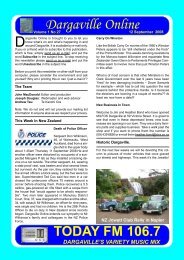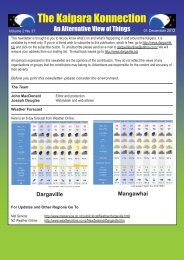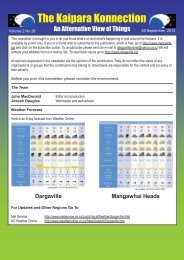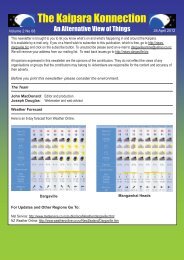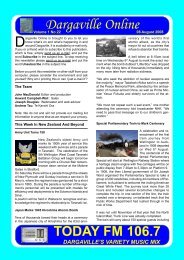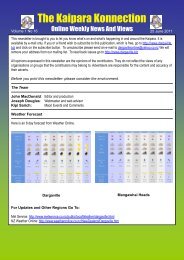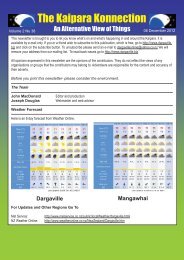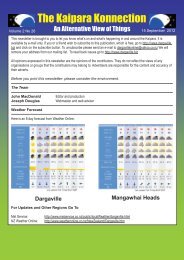9th - Kaipara Konnection Weekly Newsletter - Dargaville.BIZ
9th - Kaipara Konnection Weekly Newsletter - Dargaville.BIZ
9th - Kaipara Konnection Weekly Newsletter - Dargaville.BIZ
You also want an ePaper? Increase the reach of your titles
YUMPU automatically turns print PDFs into web optimized ePapers that Google loves.
“The one thing that doesn’t abide by majority rule<br />
is a person’s conscience.” -- Harper Lee<br />
• English literature didn’t reappear until after 1200: Changing political climates led to the Provisions of Oxford, a<br />
constitution-like document written in English in 1258. By 1300, English as a language had taken hold again.<br />
• Half the words we use today have roots in Old English: Although Old and Modern English look incredibly<br />
different, words as diverse as “water” and “be” are merely forms of words that came into English use centuries<br />
ago.<br />
• There are more than 125 English dialects worldwide: Each dialect uses English in its own way, from<br />
pronunciation to construction.<br />
• More English speakers reside in the U.S. than anywhere else: More than 250 million Americans speak English<br />
(and it’s the first language for 215 million of them), placing it easily at the top of the list. Second place? India,<br />
with 125 million.<br />
• Dozens of nations have English as their official (or co-official) language: These include the U.K., Ireland, New<br />
Zealand, South Africa, and Australia.<br />
• The first purely English dictionary appeared in 1604: It was called A Table Alphabeticall [sic], and it was written<br />
by a schoolteacher named Robert Cawdrey. It was far from a complete guide to the language, and it would take<br />
a century and a half for the next step to be made.<br />
• According to Illinois state law, it is illegal to speak English: The officially recognized language is “American.”<br />
• There is a word in the English language with only one vowel, which occurs five times: “I n d i v i s i b i l i t y.”<br />
• “Checkmate” is more literal than you think: The chess term is an alteration of “shah mat,” a Persian phrase that<br />
meant “the king is ambushed.”<br />
• No one knows who came up with “the whole nine yards.”: The most widely cited story to explain the origin of<br />
this phrase, which means “completely” or “using everything,” is that soldiers in World War II started using it<br />
in reference to firing the entire length of an ammunition belt on an anti-aircraft gun. Yet there are no written<br />
instances of the phrase before 1962, and many other stories and theories have been advanced. Everyone<br />
knows what it means; no one knows how it got here.<br />
• There’s a reason typists practice using “The quick brown fox jumps over the lazy dog.”: It contains every letter in<br />
the alphabet, making it ideal for mastering keyboard layout.<br />
• The longest word in the English language: According to the Oxford English Dictionary, its<br />
pneumonoultramicroscopicsilicovolcanokoniosis. The only other word with the same amount of letters<br />
ispneumonoultra-microscopicsilicovolcanoconioses, its plural.<br />
New AsiaN Restaurant<br />
73 Victoria Street <strong>Dargaville</strong>. Phone (09) 439 8388<br />
Dine in - Takeaways - Open 7 Days - Licenced



